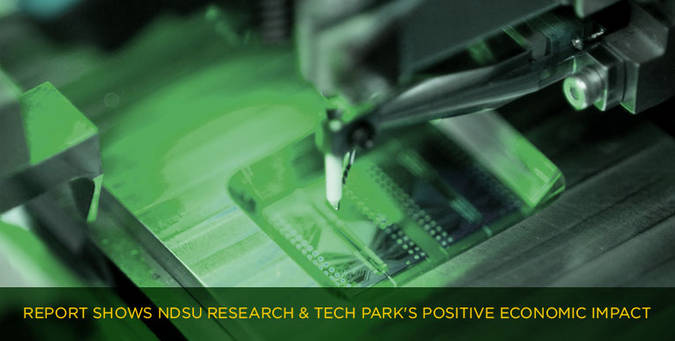 |
Report shows NDSU Research & Tech Park's positive economic impact
The NDSU Research & Technology Park positively impacts economies, helps create jobs and helps generate revenue for local and state governments, according to a new report by an independent economic impact firm. Most notable, the total number of jobs in the Park jumped more than 74 percent over the past five years. By 2011, out-of-state revenues flowing to businesses in the Park are expected to have grown 74 percent, and international revenues will likewise have grown 77 percent.
"Research universities are uniquely positioned to foster and create a more diversified economy, and the unprecedented success of NDSU's research park in the few years of its existence serves to illuminate that point," said President Dean L. Bresciani.
The Idaho firm, Economic Modeling Specialists, Inc., (EMSI), examined a range of economic indicators to analyze the NDSU Research & Technology Park's performance from 2007 to 2010, with projections for 2011.
Highlights of NDSU Research Park economic impact repo
- The 19 businesses located at the NDSU Research & Technology Park account for 893 direct, on-site jobs, and an additional 551 indirect, off-site jobs.
- Out-of-state sources pay for an estimated two-thirds of all jobs, earnings and local tax revenues generated by NDSU's Research & Technology Park.
- The total number of jobs in the Park increased more than 74 percent from 2006 to 2010, from 511 to 893.
- Industries in NDSU's Research Park pay out $50.9 million in wages annually and account for another $22.7 million in indirect off-site wages, due to multiplier effects, for a total of $73.6 million in labor income in North Dakota.
- The NDSU Research Park generates an estimated $10.9 million per year for state and local governments, which includes $7.3 million in government revenues through sales taxes, personal and corporate state income taxes and other charges, both directly and indirectly.
- The Park generates an estimated $3.6 million annually for governments through property taxes, other taxes and fees, both directly and indirectly.
- Approximately 65 percent to 70 percent of the NDSU Research Park's annual revenues originate from of North Dakota.
- By 2011, out-of-state revenues flowing to businesses in the Park are expected to have grown 74 percent, while international revenues will have jumped 77 percent.
- Total revenues flowing into the Park increased 51.8 percent from 2007 to 2010, from $95.8 million to $145.5 million. For 2011, projected revenues flowing into businesses in the Park are $172.8 million.
- The report estimates that Research Park industries and off-site, linked businesses generate $28.4 million in direct or indirect property income in North Dakota. This measure includes retained earnings, dividend, interest and bond payments and depreciation allowances.
- Companies in the NDSU Park conduct trade with 26 nations on six continents, contributing approximately 10 percent of the Park's revenue.
- Clients in the NDSU Technology Incubator received approximately $3.9 million in private and other grants, venture capital and angel investment funds in 2008. In 2011, such funding is projected to be $16.1 million.
- Businesses in the Research Park pay an average salary of $57,000, up from $51,000 in 2005.
- Four of 19 companies in the Research Park earn royalty and licensing revenues from patents and discoveries and for every $1 of costs incurred, companies earn $2.80 in present value terms.
- On-site employment in the Park includes 138 jobs for NDSU students and 286 jobs for NDSU graduates, for an estimated 32percent of Park jobs held by NDSU graduates and 15percent held by NDSU students.
The report also provided an opportunity for NDSU graduate student James Dravitz of East Grand Forks, Minn., who led the data collection and coordinated the study. "The opportunity helped apply my critical thinking and communications skills as a master's student in business administration at NDSU," said Dravitz, who worked with tenants in the Park on the project. "It has been a great learning experience."
Companies participating in the study included Bolder Thinking, located in NDSU's Technology Incubator. "Launching a business is always challenging and is based on having a really good idea, a solid business model, and a great team," said John Jasper, founder of Bolder Thinking. "The NDSU Research & Technology Park is a great platform on which to connect with the talent coming out of NDSU. As we grow our Cloud Telephony business, Bolder Thinking will continue to expand our technology development and business operations within North Dakota," said Jasper.
Combining Park opportunities with NDSU's areas of research expertise has been a key to achieving these results. "Companies have located in the Park for a variety of reasons, including access to NDSU student and faculty researchers in areas such as coatings, microelectronics and engineering." said Philip Boudjouk, vice president for Research, Creative Activities and Technology Transfer at NDSU. "Companies here also have an interest in licensing the technologies developed at NDSU."
The report's summary noted: "The overall picture indicated by EMSI's look at the RTP is one of strong economic performance, significant job and income-creating effects, and a substantial contributor to North Dakota's tax base, both state and local. Future growth at the Park will contribute not only to the Fargo economy, but elsewhere in the state through economic multiplier effects."
The NDSU Research & Technology Park commissioned the study at a cost of $8,500 to track economic impact and progress of the Park. NDSU's Department of Agribusiness and Applied Economics conducted a less comprehensive economic impact study in 2006.
The latest economic impact report is available at www.ndsuresearchpark.com/ABOUT/Pages/events.aspx
A list of businesses in NDSU's Research & Technology Park is available at www.ndsuresearchpark.com/Tenants/Pages/default.aspx
<link internal-link archive>Back to Archive


